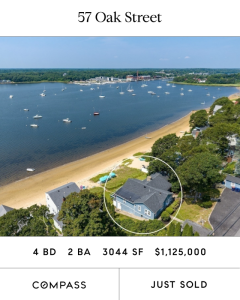Opinion: Communities have control over the nitrogen pollution problem
To the editor:
MassDEP has proposed a set of regulations to address the nitrogen pollution degrading our coastal waters, including the Westport and Slocums Rivers. Action by the state and local communities to tackle this problem is long overdue.
The current MassDEP proposal provides Towns the option to develop a “Watershed Plan” aimed at restoring water quality in nitrogen polluted areas over the next 20 years. This allows towns the chance to comprehensively and carefully assess what actions it should take to reduce nitrogen pollution and protect water quality for future generations.
Opponents of taking action on nitrogen pollution have focused on the other avenue provided by the MassDEP proposal which requires that all septic systems in town be upgraded to nitrogen-reducing technology within five years. This alternative is only triggered IF a town refuses to launch a Watershed Plan process.
We cannot imagine why a town would opt to burden homeowners by a five year septic upgrade requirement, just to avoid making plans to address pollution over the next two decades. Upgrading everyone’s septic system would only be the consequence of a town’s failure to plan.
The watershed permit approach allows a community to pursue a plan tailored to each community’s unique needs. A solution may include expanding sewer connections, upgrading septic systems, inlet widening/dredging, storm water remediation, passing composting regulations, or other efforts that result in nitrogen pollution reductions. While watershed permits hold the community accountable and expect action, it also provides communities with more flexibility to implement the right mix of solutions to meet environmental goals and allows for more federal money to help offset cost. The Coalition urges communities to embrace the watershed permit approach over upgrading all septic systems.
The Science is Sound.
There is no argument that our water quality has declined region-wide due to nitrogen pollution. Thirty years of water quality data showing the poor quality of coastal waters is available at www.savebuzzardsbay.org/bay-health. There is also general agreement in our communities that we need to take action to save our waters. DEP’s proposed regulations allow towns to decide how to act.
Decades of science clearly point to on-site septic systems as a major contributor to water quality decline region-wide. It is irrefutable that conventional systems are not designed to treat for nitrogen. We cannot continue to install systems we know add to the pollution problem. We are all part of this problem and we need thoughtful planning and financing options to support the solution.
We Must Act Now.
NOW is the time for our communities to take action to take advantage of the federal infrastructure money available. The influx of federal money from the Bipartisan Infrastructure Law will only be available for the next five years. When that money is spent, we will have to fight for additional federal financial resources. Slowing the process down at this time robs our communities from access to federal money available now.
There is no dispute that solving this problem, however a community decides to act, will cost money. We need to continue to tell our elected officials that our homeowners and towns need more money to solve this problem.
Please join us in encouraging your town officials to develop a Watershed Plan and support DEP’s action to clean up our waters.
Korrin Petersen, Esq.,
Vice President of Clean Water Advocacy
Buzzards Bay Coalition


























